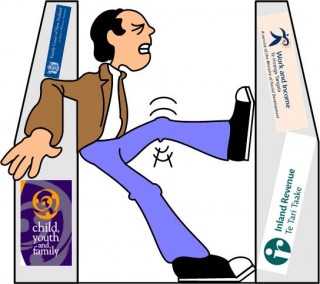Taking On Government Departments
by Jonathan Young

Through our work at the Father & Child Trust, we often support clients in their meetings with government departments, especially when it is concerning their children or their money.
Although, we are by no means experts, we have picked up a few tips along the way.
The first, and probably most logical, is to never lose your temper with the department’s representative. Often, if somebody is criticising your parenting or trying to take your money the response is to threaten to have them fired, or to remove (or kick) important parts of their body.
I’ve never seen this strategy achieve the desired goal.
At the risk of sounding like I stayed home on cold days when I was a student, this next lesson comes from Oprah Winfrey, and it’s a good one.
Never accept a “NO” from somebody who doesn’t have the authority to say “YES”. If you’re dealing with a Customer Services Representative in a call centre, and you often will be, it’s not usually their job to make decisions.
If you’re not getting anywhere with them, a polite “Do you have the authority to approve this payment?” usually goes down better than “I want to make a complaint. Get me the manager”.
Similarly a quiet and sullen “I’m very disappointed” works a lot better than “You guys are rubbish. You can’t even do your f***ing jobs. My taxes pay your wages!”
The second, and not quite so obvious, is that you have the right to have a support person with you when you are dealing with a government department. If you prefer you can nominate to have this person deal with the department for you.
Having a person from a community organisation with you at such appointments seems to ensure that the employee will do the utmost to be professional and courteous. It also means that your support worker can talk to the staff member without being emotionally involved in the situation.
It’s not their child, or their money that is being talked about here.
I’ve had many requests from Father & Child Trust members to help them sort out a situation with Work and Income New Zealand. For a while I thought I might have been some kind of social-working God because clients seemed to have a much easier time with WINZ when I accompanied them to their appointments.
I eventually realised that these appointments went just as well if I just sat there and said nothing.
It’s a very big advantage to know your facts before you attend any kind of meeting, especially if it’s at Work & Income (WINZ). The WINZ website, www.winz.govt.nz, contains a section called MAP (Manuals and Procedures).
This is basically identical to the manual that case managers use when deciding what, if any, assistance a client is entitled to. It contains a list of all assistance available, and is useful for non-beneficiaries as well.
Another fantastic website is
www.workingforfamilies.govt.nz.
It contains basic information about what money you may be entitled to. It also has calculators built in, so you can see how you would be affected by earning slightly more, or slightly less money.
Even with advertising campaigns, we find that many families aren’t claiming everything that they’re entitled to through ‘Working For Families’, so it’s definitely worth a look. It also contains a calculator to work out if you’re entitled to an Accommodation Supplement from WINZ.
One member recently ‘rejigged’ his mortgage, which meant that he now receives an accommodation allowance each week.
The IRD is often a big one for fathers, either trying to claim child support from their children’s mothers, or believing that they pay too much in child support. There’s a lot of information on the departments’ website – www.ird.govt.nz.
It also contains calculators so you can work out how much better, or worse, off you would be earning more of less each year.
Many ‘non-custodial’ parents, actually discover that they do qualify for ‘shared care’ which lowers their child support payments, and could also mean that they’re entitled for ‘Working For Families’ money.
In dealing with any government department, the biggest thing to remember is to never be mean or aggressive. Most telephone calls are recorded, and it doesn’t help if the next time that you phone the call centre, the representative finds a ‘must read’ note on your file that says your difficult to deal with.
Call centre staff don’t usually get paid a lot, so don’t be surprised if they ask for a pay-rise if you tell them that you pay their wages.




